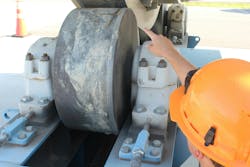Rotary drum maintenance: Training makes all the difference
Rotary drums are critical processing tools in industries such as mining and minerals, chemical production, pulp and paper processing, and more. These drums are used to achieve many objectives, including drying and cooling, granulation, high-temperature thermal treatment, and coating, among others.
Despite their ubiquity, however, many facilities face operational challenges that can lead to inefficiencies, costly downtime, and even safety hazards. All these issues can often be tied directly to improper staff training.
The key to an efficient operation and equipment longevity in any operation is properly trained operators and maintenance personnel. Even a basic understanding of rotary drum operation and maintenance procedures can mean the difference between an efficient operation that runs smoothly and experiences little downtime and one that is rife with shutdowns, maintenance problems, and mounting costs.
Consequences of poorly trained personnel
Operations with poorly trained personnel are frequently victims of:
Excessive maintenance & labor costs. A rotary drum that is not properly operated and maintained will quickly begin to accumulate unnecessary maintenance and labor expenses. This may be the result of a failure to recognize the onset of a problem, allowing it to escalate into major damage, added labor costs for increased equipment cleaning, frequent component replacement, or otherwise. Inadequate lubrication on trunnion wheels, for example, can lead to the need for grinding (resurfacing) or even total replacement. Similarly, a small crack not identified by regular inspections has the potential to escalate into a structural failure. These costs can quickly mount into major expenses, threatening the economic viability of an operation.
Lost production. In addition to the cost of lost product, increased downtime and poor-quality product put production schedules at risk, resulting in all manner of subsequent problems.
Safety concerns. Safety is a top priority when working around rotary drums. Operators and maintenance personnel must be well versed in appropriate safety precautions and where potential hazards exist to avoid dangerous mistakes and situations.
Potential benefits of maintenance and operator training
In contrast, facilities that promote a culture of safety and ensure that workers have a solid understanding of their operation can garner the following benefits:
Minimal downtime. Properly trained operators and maintenance personnel can minimize downtime by recognizing the onset of potential problems and taking immediate action. They can implement predictive maintenance strategies and use data from sensors or performance metrics to prevent issues before they occur.
Lower maintenance costs. Catching problems early, before they escalate into major damage or repairs can significantly reduce maintenance costs and the need for replacement parts.
Safer operating environment. Personnel with a thorough working knowledge of the drum and any potential hazards are much less likely to cause or contribute to an accident than inexperienced or ill-informed personnel.
Optimized process efficiency. Well-trained operators can often provide unparalleled insight into the process, optimizing it for maximum efficiency. This might include fine-tuning drum speed, adjusting airflow to achieve better product uniformity, and recognizing subtle changes in key performance indicators (KPIs).
Improved product quality and consistency. A well-optimized process yields maximum product quality and consistency.
Extended equipment service life. Equipment that has been properly operated and maintained is likely to experience a significantly longer, more reliable service life.
It is important to recognize that while most plant managers consider training a part of commissioning a new facility, the benefits of training can far exceed new operations. At any stage of a plant’s life cycle, training can only provide benefits, and even seasoned personnel will walk away with improved insight. Training may also be necessary as process conditions change.
What training should cover
The training content and process will vary from one provider to the next and across different types of operations and rotary drums. Training programs should also consider the staff’s current understanding of their operation. In general, all training should cover the following and provide a good balance between theory and hands-on demonstration.
- Basic adjustments and maintenance procedures
- Lubrication and general maintenance best practices
- Float/training
- Trunnion alignment
- Alignment of drive components
- Maintenance checklists and inspection points
- Measurements to monitor
- Drum safety
- Lockout-Tagout (LOTO)
- General safety precautions
- Potential hazards
- Process-specific considerations
- Process adjustments and fine tuning
- Troubleshooting tips
- Q&A
In addition to tailoring the program to the staff’s current knowledge, it is important that staff are also trained on the unique conditions and challenges their specific operation presents. While a one-size-fits-all program may provide some benefits, incorporating their actual production line and the challenges they face every day is invaluable.
A well-trained staff is a smart investment
Maintenance and operator training is an essential tool in any operation and should be an ongoing pursuit. By investing in comprehensive rotary drum training, your staff can be trained to recognize problems before they become larger and more costly issues. The benefits gained from this can range from minimizing downtime to reducing maintenance costs and ensuring a safer, more efficient operation. Where every minute of downtime can translate to significant losses, the value of well-trained employees cannot be overstated.
About the Author
Craig Peppin
Customer service manager at FEECO International
Craig Peppin is customer service manager at FEECO International.



